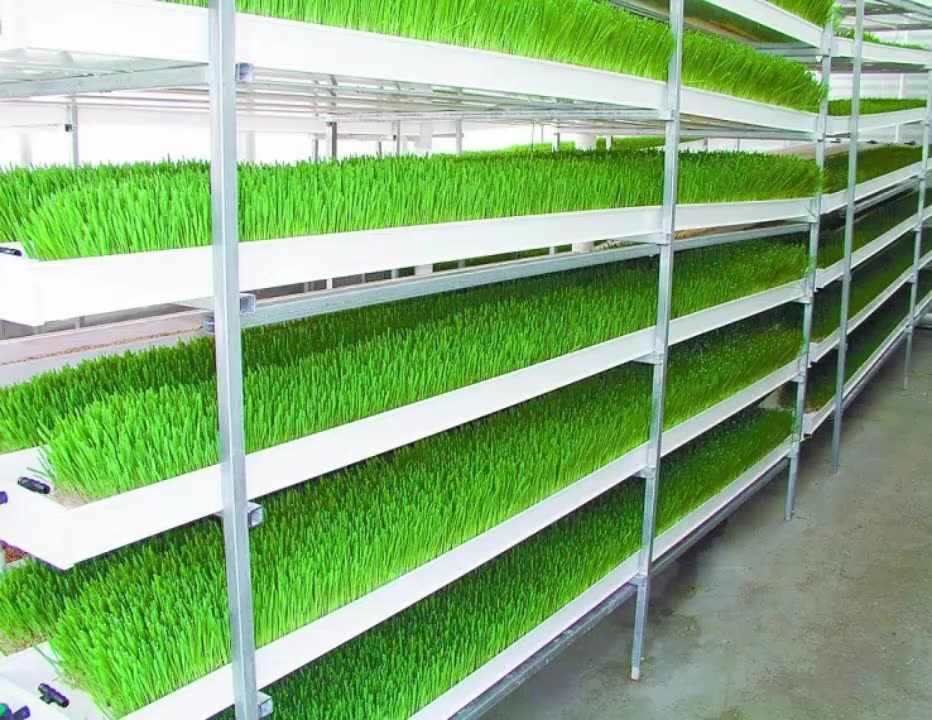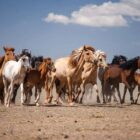In this blog post, we’ll explore the benefits of fresh fodder for your livestock.
You might be wondering, what is fresh fodder? Fresh fodder is simply fresh, green plants that are fed to livestock. It can be any type of green plant, including grass, clover, alfalfa, and more.
Fresh fodder has amazing benefits for livestock, including improved digestion, better nutrient absorption, and increased production of milk and meat.
What is Fodder?
The feed given to domesticated animals including cattle, horses, camels, rabbits, sheep, chickens, and pigs is referred to as “fodder.” Animals grazing and foraging for food on their own are in contrast to this feeding technique.
A grain, such as barley or wheat, is sprouted in trays, allowed to grow for about seven days, and then fed to livestock as fodder. Everything, including sprouts, seeds, and roots, is consumed by the animals.Some of the most popular plants raised for fodder include the following:
- Alfalfa
- Barley (most common)
- Clover
- Grass and Meadow Grasses
- Corn (maize)
- Millet
- Oats
- Sorghum
- Wheat
Barley seed is frequently the grain of choice for producing fodder due to its high nutritional value, availability, and high seed weight to fodder output ratio. In most cases, one pound of barley grain produces six pounds of fodder in approximately one week.
Fresh Fodder — Food of Future?
Livestock is often fed a diet of grains and hay, with the occasional green leafy vegetable. However, research has shown that fresh fodder, such as wheatgrass, can have a number of benefits for your livestock.
Fresh fodder is higher in nutrients, vitamins, and minerals than dried or processed feeds. It also contains more enzymes, which are essential for digestion. In addition, fresh fodder is a natural laxative, which can help keep your livestock’s digestive system healthy.
Livestock Benefits
- Studies have proved that feeding freshly sprouted barley to dairy cows increases milk production and improves milk quality.
- The presence of vitamins in this premium feed helps to reduce the need for synthetic vitamin supplements.
- Animals that were fed fresh fodder grown on farms had a higher reproductive rate.
Benefits for Poultry
Growing and giving your poultry animals fodder has a lot of advantages. The following are some of these advantages:
- It gives your animals a variety of natural nutrients.
- Gives your animals access to fresh greens all year long.
- Sprouts are so high in chlorophyll and beta-carotene, eggs with darker yolks and greater nutritional value can be produced.
Benefits for Cattle
If you want good health for your cattle, then you’ll have to have in mind some requirements for the fodder. The health of the animal will improve with good fodder.
The quality of the dairy, fiber, and meat will be improved and there will be a decrease in the incidence of parasite infections. The other advantages of fresh fodder are
- Enhance Fleece quality
- Improves Hydration and pH in the rumen
- Reduces the chances of parasite development
- The fodder helps reduce the stress on ewes with weaning Lambs
- Helps cattle gain weight faster
- Improves the health of the hoofs
Benefits for Horses
There is no denying the benefits of including fodder in the diet, particularly for horses without access to green grass. A high-quality forage, fodder has a calorie content that is almost as high as grain but is higher in fiber.
The high water content promotes the easy transit of food through the digestive system, which may lessen the likelihood of colic and digestive discomfort. In addition, the vitamin content of fodder is substantially higher than that of hay.
According to available data, fodder promotes a healthy balance of intestinal microorganisms and may improve the digestion of other dietary nutrients of a Horse.
In conclusion, there are many benefits to feeding dairy cows fresh fodder. Fresh fodder is easier to digest, which conserves energy and promotes fertility. Additionally, fresh fodder improves milk yield and quality.
In addition to providing a valuable source of food, they can also be used for their wool, leather, and other products. Ensuring that your livestock is healthy and happy is crucial to your success as a farmer, and one of the best ways to do this is to feed them fresh fodder.




